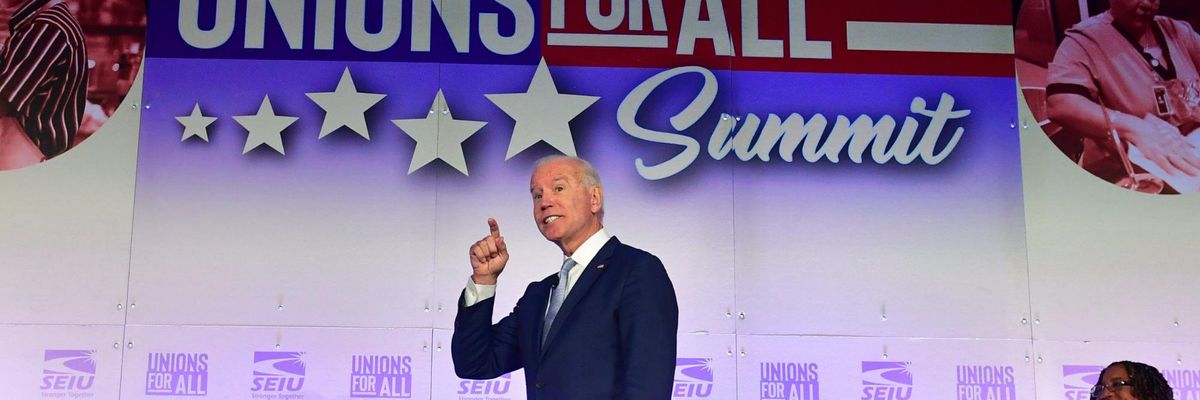President Joe Biden likes to say, "I'm a union guy." Unfortunately, as Vice President from 2009 to 2017, his boss, Barack Obama wouldn't let him be a "union guy." Even with large Democratic majorities in Congress and control of the White House, worker needs went unmet.
Setting records for raising Wall Street campaign cash, Obama reneged on his 2008 promise to raise the federal minimum wage from $7.25 to $9.50 per hour by 2011. He reneged on a promise to the AFL-CIO to push for "card check" to facilitate workers wanting to form a union. He did nothing to preserve traditional earned worker pensions provided by corporations while bailing out Wall Street crooks whom he refused to prosecute.
Obama stubbornly blocked an eager Biden from going to speak at a massive workers' rally in Madison, Wisconsin at the critical time when Democrats were challenging corporatist Governor Scott Walker's anti-union "budget repair bill."
One would think after eight years of biding his time, a liberated Joe Biden would be the most pro-union labor president since Franklin Delano Roosevelt. He probably is by default, due to the cowardliness of his predecessors who would have lost some of their own elections without union support.
"The problem with the PRO Act, like its legislative predecessors over the past 60 years, is its faint-hearted attempt to chip away at the unmentioned, gigantic, anti-union TAFT-HARTLEY ACT OF 1947--a devastating anti-organizing and union representation law."
The question now is: Given the entrenched deprivations of workers and abandonment of labor to serf-labor countries abroad, is President Biden pro-union-labor enough, apart from the temporary Covid-19 relief? The answer has to be a qualified, NO.
He has dropped into limbo the long-overdue $15 federal minimum wage from his legislative priorities. He did give strong verbal support to the Amazon workers union-organizing drive at a warehouse in Bessemer, Alabama. However, when the workers lost, Biden did not assail the extreme union busting tactics by Amazon that exploited weak labor protection laws. He has finally nominated the new head of OSHA - the under-funded, Trump-wrecked job safety agency that is in shambles.
What he has done is come out strongly for the Congressional Democrat's latest version of labor law reform--the Protecting the Right to Organize Act (PRO Act) that passed the House on March 9, 2021, with a 225-206 vote.
The problem with the PRO Act, like its legislative predecessors over the past 60 years, is its faint-hearted attempt to chip away at the unmentioned, gigantic, anti-union TAFT-HARTLEY ACT OF 1947--a devastating anti-organizing and union representation law.
The Taft-Hartley law was so extreme that its principal author, Senator Robert Taft (R-OH), offered to amend some of its sharpest claws in the late 1940s. His offer was rejected by outraged unions who wanted a more significant repeal. That, astonishingly, was the last major bellow by the large unions and the AFL-CIO against this stifling chokehold over the union movement. Union membership in the corporate sector is at 6.3 percent. Overall union membership regularly hits new lows.
Even mentioning the repeal of Taft-Hartley by unions and Democratic candidates has become taboo. When campaigning for president in Detroit at a labor hall in 2004, a retired UAW worker came up to me with tears in his eyes. He said, "I never thought I would hear getting rid of Taft-Hartley from a presidential candidate."
On the 50th and 60th anniversaries of Taft-Hartley's passage by a Republican Congress - that is 1997 and 2007 - I strenuously urged the AFL-CIO and the largest unions to hold public demonstrations of protest. (Does anybody think big business would have allowed such handcuffs without battling year after year for repeal?)
The union leaders wouldn't inform the public of this pernicious law with a national event against this tragic curtailing of worker's freedoms to band together and bargain together in major workplaces such as Amazon, Walmart, and McDonald's. No other western country allows such draconian anti-labor restrictions.
Unions are waiting on the Democratic Party to lead while the Democrats are waiting upon big business. Biden should make ending the anti-worker, anti-union, and pro-employer union-busting, Taft-Hartley Act the battle cry for the Republic. The PRO Act doesn't come close to this objective.
Taft-Hartley is a wide-ranging, intricate paradise for union-busting law firms, corporatist legislators, and atavistic judges. It authorized states to enact so-called "right to work" laws or more properly named "right to shirk" laws, allowing workers to keep benefits of union contracts but not pay union dues. This provision vastly decreases union membership and increases employer leverage to resist union organizing.
Taft-Hartley gives employers all kinds of ways to block union certification elections, harass workers with demands for obstructionist hearings on what is an "appropriate bargaining unit," permits aggressive anti-union organizing, and outlaws the "closed shop" for union solidarity.
One of the most damaging provisions defines "employees" so as to exclude supervisors and independent contractors. This greatly diminished the pool of workers eligible to be unionized. For example, years ago AT&T widely expanded the number of "supervisors" to both deplete the union membership numbers and use their "supervisors" as management control tools.
Taft-Hartley has other pro-management provisions, including controls over pensions, disclosure of information, and workplace time for union purposes.
Once Taft-Hartley was on the books, its restrictions were strengthened by the courts and the National Labor Relations Board (whose last pro-corporate general counsel was just fired by Biden). With the expansion of the "gig economy," by Uber, Lyft, Airbnb, and other companies whose business model is built on having no employees, the challenge for American workers is nothing less than displacing anti-labor dictates with a comprehensive worker's human rights law.
The PRO Act is decidedly not anywhere near Biden's recent recognition that "Nearly 60 million Americans would join a union if they get a chance .... They know that without unions, they can run the table on workers - union and non-union alike."




